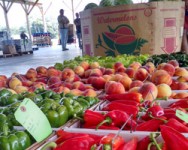Event Details
Date
February 18, 2016
Time
1:00 PM - 3:45 PM
Location
CCE Orleans County
12690 Rte 31
Albion, NY 14411
Cost
This event is free.
Host
Cornell Vegetable ProgramJudson Reid
585-313-8912
email Judson Reid
2016 Auction Growers Production Meeting (Orleans)
February 18, 2016
This course will educate growers on disease and pest management, varieties, soil management, and marketing issues in open field and high tunnel vegetables. Topics such as disease resistant varieties, managing pests (weeds, diseases, birds), cultural management and appropriate spray options.
There will 3 grower panels during this event. Weed control and Best Management Practices for Auction will be discussed by the first panel. A sweet corn grower panel will discuss varieties, seeding dates, and auction sales. The final grower panel will focus on soil management for Orleans County clay.
DEC recertification credits will be available.*
AGENDA:
1:00 PM Registration, DEC sign-up - Judson Reid, Cornell Vegetable Program
1:05 Vine Crop Pest/Disease Management Update - Judson Reid and Robert Hadad, CVP
1:35 Grower Panel - Vine Crops: Weed Control and Best Management Practices for Auction
1:55 Bird Control Research Update - Darcy Telenko, Cornell Vegetable Program
2:15 Grower Panel - Sweet Corn: Varieties, Seeding Dates, and Auction Sales
2:35 High Tunnel Tomatoes: Containers vs Soil for Fertility, Economics and Disease Control - Judson Reid, Cornell Vegetable Program
2:55 Coffee break
3:10 Grower Panel - Soil Management for Orleans County Clay
3:45 Adjourn and credit distribution-CVP Staff
This event is free to attend. Contact Judson Reid for more information.
* Participants will be required to present Applicator License and sign roster before the beginning of the program. Only attendees who remain for the duration of the program will receive a certificate. Cornell Vegetable Program staff will supervise process and distribute certificates at the conclusion of the program.



































